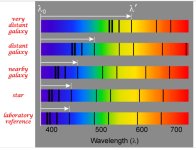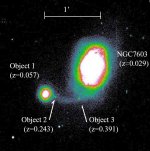To be more clear, it's cosmological redshift that is being questioned, not Doppler effect redshift.The fact remains that redshift exists, and measurements of it show structure on a universal scale.
Except that there is more redshift than can be accounted for by simple physical motion of an object relative to us.Here's the thing, I don't believe it is either. Your past arguments on the topic have convinced me that it is not.
I've always considered redshift (and blueshift, for that matter) to be caused by motion, not by distance, specifically motion towards or away from an observer, which fits, considering scripture plainly telling us that God stretched out the heavens, which is a matter of motion, or more accurately, velocity, in the direction of "away" from earth. This even fits with the idea proposed on https:/kgov.com/stretch that "God pulled the light from the stars," in that He did so while moving the stars away from the earth.
There are things that are so red shifted that things that supposedly started off producing light in the visible spectrum are now mostly in the infrared. There is no amount of speed that could ever cause that much shift. The explanation is that space has been stretching itself out for so long a period of time that the wave length of the light has been likewise stretched into the infra red.
Doppler effect red and blue shifts are quite small by comparison because the objects motion relative to us is a tiny fraction of the speed of light.

Actually, all I've said is that there is no evidence for a center.I think the problem I'm seeing is that what you've said so far is based on a lack of evidence, rather than positive evidence for either side.
To be sure, the universe either has or does not have a center and edges (or at least, a boundary where "matter is present in this location" ends and sheer vacuum (where no matter is present) begins). There's no in between.
But so far, you've simply asserted that there is no center because there is no evidence for it, but this is an argument from silence, a logical fallacy, which I will address in responding to your reply to Stripe below:
The idea that space has an edge implies that space exists at all. I have no good reason to believe that it does. It seems to me that space is as much an idea as time is. Time is the duration and sequence of events relative to other events. Likewise, space is the distance between and the position of, objects relative to other objects. If that is so then it is meaningless to speak in terms of space having a defined size or boundary. In such a case it would be, in effect, infinite and thus without a definable center.Upon what basis do you assert that the universe is infinite?
It almost seems like you're begging the question...
It doesn't make if false either.Saying it doesn't make it so, though. Hence my above question.
I cannot prove a negative. If you think there is evidence for a center of the universe then it would be your burden to produce it.
No, it isn't.This is begging the question that there is no center.
The idea that there is a center is a conclusion that requires premises in the form of evidence. If there is no evidence, it doesn't prove that a center doesn't exist but any suggestion that there is would be speculation.
It is vanishingly small to the point of virtual non-existence. It would literally only exist in a theoretical/mathematical sense. There is no force of any measurable kind that would not overwhelm it. The very act of attempting to measure it would totally obscure its existence by several orders of magnitude. No matter how you cut it, being at the center of the universe would have no detectable effect due to gravity whatsoever.But the fact remains that it does, in fact, have an effect, even if it is infinitesimally (man, that's a word I haven't typed in a while, lol) small.
Center of mass? That's a different subject.Something else I want to point out regarding center of mass that should help us in determining if there is a center that seems to have been forgotten...
Only meaningful if space is something other than an idea.The so-called "Axis of Evil" indicates a north and south pole for the universe.
I would argue that if the universe were infinite, then there would be no indication whatsoever that it has an axis, which is, per the Cambridge dictionary, "a real or imaginary straight line going through the center of an object that is spinning, or a line that divides a symmetrical shape into two equal halves."

axis
1. a real or imaginary straight line going through the centre of an object that…dictionary.cambridge.org
The center of mass is a different notion but even then, there would be absolutely no detectable effect related to gravity at the center of mass of the universe. Imagine yourself at the dead center of a Dyson Sphere or better than that, image that the Earth was hollow and at the center of it was a habitable bubble where the whole mass of the Earth was surrounding you but not crushing you into a hot cinder. The effect you'd feel in terms of gravity, would be the same as if you were the Earth itself. You'd be in free fall toward the Sun but moving laterally at a rate sufficient to keep the Sun's surface at the same distance from you. In short you'd be in orbit around the Sun and would feel just as weightless as astronauts do on the Space Station when they are in orbit around the Earth.
You could extend the concept to the Sun. If you were at its center then you'd be the center of gravity for the Solar System and aside from the gravitational effects of the planets, you wouldn't feel the gravitational effects of ANYTHING whatsoever to any degree that is measurable. As far as gravity is concerned, outside the solar system objects, there is nothing having any gravitational effect on the Sun.
This fact is central to the reason why they felt the need to come up with the rescue device that we call "Dark Matter".
Last edited:


